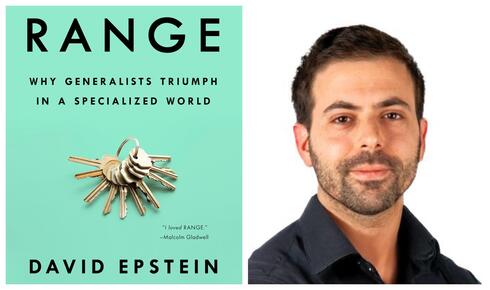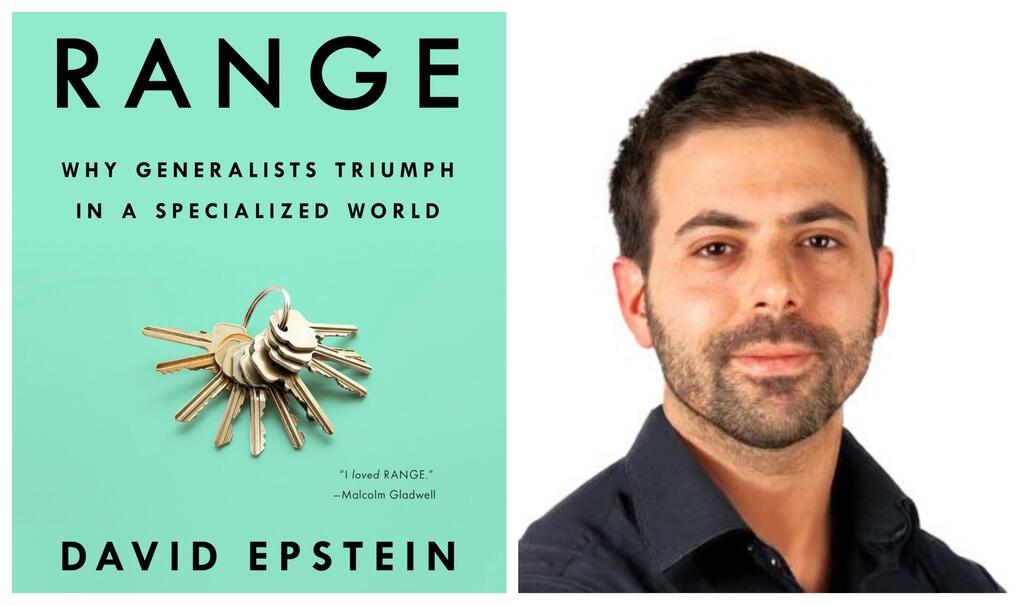
BiblioTech
CTech’s Book Review: Taking a generalist approach to today’s changing world
Daniel Shimoni, VP of Product at Lusha, has joined CTech to share a review of “Range: Why Generalists Triumph in a Specialized World” by David Epstein.
Daniel Shimoni is the VP of Product at Lusha, a sales intelligence platform designed to help businesses get their next customers. He has joined CTech to share a review of “Range: Why Generalists Triumph in a Specialized World” by David Epstein.
Title: “Range: Why Generalists Triumph in a Specialized World”
Author: David Epstein
Format: Tablet
Where: Home
Summary:
In “Range: Why Generalists Triumph in a Specialized World” by David Epstein, the author explores how success in a rapidly evolving and unpredictable world often favors generalists over specialists. Using research, case studies, and compelling narratives, Epstein dismantles the "early specialization" myth, which suggests that focusing narrowly from a young age is the only way to achieve mastery. Instead, he highlights the power of broad experience, showing how generalists excel by connecting diverse ideas and adapting to new challenges.
From athletes and scientists to artists and entrepreneurs, the book reveals how a wide range of skills and experiences can lead to creative breakthroughs and greater resilience in problem-solving. Epstein also delves into the importance of flexibility and learning agility in navigating "wicked" environments where rules are unclear and solutions are not straightforward.
Important themes:
- The Myth of Early Specialization: Epstein argues against the widely accepted idea that early and intense focus in one field guarantees success. Instead, he highlights the value of a "sampling period," where individuals explore multiple interests before settling on a single pursuit. This approach fosters curiosity and allows for a more informed career path.
- Breadth Over Depth: Generalists often excel because they integrate knowledge from different fields. By drawing connections across disciplines, they create innovative solutions and approach challenges with fresh perspectives that specialists may lack.
- Adaptability and Learning: In a world where industries are changing faster than ever, the ability to learn quickly and adapt to new environments is critical. Generalists thrive in these situations, as their varied experiences prepare them to tackle diverse and unexpected problems.
- Analogical Thinking: Generalists are skilled at applying concepts from one domain to another, leading to groundbreaking insights. This analogical thinking is a key driver of creativity and innovation.
- The Limits of Deliberate Practice: While deliberate practice is valuable in structured, rule-based environments (like sports or chess), Epstein shows that in ambiguous and unpredictable areas such as business or science, broader experience is more advantageous.
- Learning from Failures: Generalists are more likely to take risks, fail, and learn from those failures. These experiences build resilience and a diverse toolkit for future problem-solving.
What I’ve learned:
Reading “Range” has profoundly reshaped how I think about career growth, problem-solving, and personal development. One of the most impactful lessons is the immense value of exposing oneself to a variety of fields and experiences. Epstein emphasizes that by broadening our horizons, we cultivate creativity and prepare ourselves for the unexpected—an invaluable skill in today’s ever-changing world, especially with the rapid advancements in technologies like AI.
The book taught me that adaptability and learning agility are not just useful—they are essential. These traits allow us to thrive in uncertain environments where traditional expertise may fall short. While specialization has its place, I now see how balancing it with generalist thinking can open doors to innovative solutions. This dual approach fosters the ability to connect ideas across disciplines, a key driver of success in complex, dynamic scenarios.
Additionally, I gained a new perspective on failure. Epstein illustrates how embracing experimentation, taking risks, and learning from setbacks are critical to growth. This has inspired me to approach challenges with curiosity rather than fear, knowing that failures often lead to breakthroughs. Finally, Range provided practical tools for cultivating a generalist mindset. From seeking out challenges in unfamiliar areas to maintaining a habit of lifelong learning, the book reinforced that broad thinking is not just a choice—it’s a competitive advantage.
Critiques:
While “Range” provides a persuasive case for the advantages of generalists, it’s not without its limitations. One critique is the book’s tendency to oversimplify the divide between generalists and specialists. Even though Epstein highlights the shortcomings of early specialization, he occasionally downplays the undeniable value of deep expertise in certain fields. Specialists remain critical in areas that require detailed knowledge, such as medicine or engineering.
Another critique is the reliance on anecdotes. While the stories are engaging and illustrative, they may not always reflect broader trends or be universally applicable. Epstein could have balanced the narrative by including more data-driven analyses. Finally, the book might benefit from a deeper exploration of the complementary roles of generalists and specialists instead of positioning them as opposing forces.
Who should read this book:
“Range” is a must-read for professionals at any stage of their career, especially those feeling constrained by the pressure to specialize. It’s ideal for parents and educators who want to encourage young learners to explore multiple interests and develop broader skill sets. Leaders and managers will also find the book valuable, as it underscores the importance of fostering diverse teams and promoting innovative problem-solving.
In today’s fast-paced and unpredictable world, flexibility and broad thinking are more essential than ever. This book offers insights for anyone seeking to navigate complex challenges, adapt to rapid change, and leverage their range of experiences to achieve success. Whether you’re building a career, mentoring others, or leading an organization, “Range” provides a powerful framework for rethinking what it means to succeed in a specialized world.















